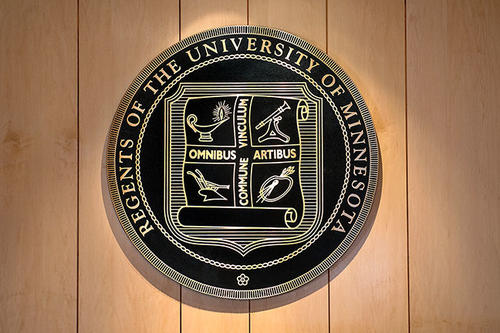
About 20,000 resident undergraduates in the University of Minnesota system will see no tuition increase in the coming year, under a $3.8 billion budget approved by the U’s Board of Regents today. Approximately 4,000 low-and middle-income students will see a tuition decrease.
“This budget reaffirms our commitment to providing a world-class educational experience that is accessible and affordable for students and families,” said Board Chair Dean Johnson. “Additionally, we are supporting critical initiatives across the University system, reallocating administrative costs and investing in our field-shaping faculty and staff.”
There is no tuition increase for all resident undergraduates on the Crookston, Duluth, Morris and Rochester campuses. On the Twin Cities campus, tuition will be increased by 2.5 percent for resident undergraduates. However, for those with family incomes up to $120,000 — approximately 10,000 students — enhanced financial aid is recommended to completely offset the increase. Graduate and professional rates remain competitive with the market, generally rising 2.5 percent. However, resident students at the Medical School will see no tuition increase.
Tuition will increase for non-resident, non-reciprocity undergraduate students on the Twin Cities (7.5 percent, or $1,550) and Morris (16.8 percent, or $2,000) campuses, with continuing students receiving waivers to mitigate the increases (held to 5.5 percent on the Twin Cities campus). At UMD, the rate will increase by 2.5 percent, or $396. Tuition, fees and room and board increases range from 0 at UMR to 2.9 percent at UMTC. Over the last five years, the average annual increase in tuition has been 1 percent on the Twin Cities campus and 0.4 percent on the other U of M campuses.
Also, this budget reallocates $15 million in administrative costs and makes available a (2.5 percent) merit- and market-based, compensation increase for faculty and staff. The total spending increase in the budget is held to 1 percent.
Addressing student mental health
Investments of nearly $300,000 and 6.5 full-time equivalent (FTE) employees for increased student mental health services on the Twin Cities campus are planned as well.
Kaler and Executive Vice President and Provost Karen Hanson have committed a total of $200,000 from discretionary office budgets in each of the next two years, adding to nearly a $100,000 in new investment from the student service fee. Together, these funds will support new staff to better address clinical care demands. Further consultation with system campuses will continue in the coming year.
“Student mental health is a top public health issue across our system,” said President Kaler. “Many students and parents have shared their concerns regarding student mental health and our approach to addressing mental health issues on all of our campuses does not end here. We also are working closely with faculty governance to identify other steps we can take to address this as the comprehensive public health issue that it is.”
More than 30 percent of students across the University system report a mental health diagnosis in their lifetime. The Board’s Academic and Student Affairs Committee discussed currently available resources at all University campuses, including some unique and innovative preventative program offerings aimed at reducing stigma as well as stress levels.
Student conduct code revised
Following a comprehensive review and consultation, the Board today approved changes to the U’s Student Conduct Code.
With continued national attention and conversation around issues regarding student conduct, the Board and administration initiated a comprehensive review of the Code last year. Medical amnesty, clearer sexual misconduct definitions and due process protections are now included. Additional changes regard peaceable assembly, interim suspension and holding student groups responsible under the code. Students, faculty and staff on all U of M campuses were consulted.
The Board also:
- Acted on the FY17 capital budget, which authorizes more than $92 million in projects aimed at repairing and enhancing facilities across the University system. The revised budget is based on the Legislature adjourning without passing a capital investment bonding bill.
- Discussed implementation efforts of Driving Tomorrow, the UMTC Strategic Plan. In a work session, Regents reviewed curriculum enhancements, research priorities and how to continue to drive the plan forward in the coming year.
- Recognized two retiring U leaders. Chief Financial Officer and Treasurer Richard Pfutzenreuter and General Counsel William Donohue will both retire at the end of the month following more than 50 years of combined service to the University.
See President Kaler's report to the Board.
The Board will meet again on July 6. On Thursday, July 7 the Board will conduct its annual retreat. For more information, including meeting times and locations, go to the Regents website.
- Categories:
- Campus Affairs





